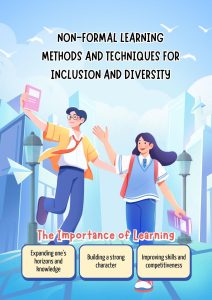
- Duration
- 5 days
- Language
- English
Course Description
The diversity of 21st-century students creates many challenges for teachers who did not experience the same diversity when they were students themselves. Among these, the most important challenge is to find a balance between “high” and “low” expectations that meet the different needs of students in a classroom and the most appropriate ways of working with students to build an inclusive learning environment.
In the process of education, non-formal education has a special role, integrated at the level of school education and youth, culture, sport, leisure, continuing vocational training, and adult education.
Our course has a modular structure, it focuses on the holistic approach to curriculum development, the teacher-student partnership in the learning process, and the principles and particularities of interactive and self-directed learning.
Available Dates & Locations
- İstanbul, Türkiye
- Mon, Nov 17, 2025 – Fri, Nov 21, 2025
- 5 Days
- İzmir, Türkiye
- Mon, Dec 8, 2025 – Fri, Dec 12, 2025
- 5 Days
- İstanbul, Türkiye
- Mon, Mar 23, 2026 - Fri, Mar 27, 2026
- 5 Days
- Alanya, Türkiye
- Mon, Aug 17, 2026 - Fri, Aug 21, 2026
- 5 Days
- Kapadokya(Göreme), Türkiye
- Mon, Aug 10, 2026 - Fri, Aug 14, 2026
- 5 Days
Methodologies Of The Course
Most of the educational approaches are inspired by constructivist pedagogy.
The course has a holistic approach and uses various tools during the activities.
Learning Outcomes
- Design and implement inclusive educational practices that cater to the diverse needs of students, promoting social justice, equity, and equality.
- Recognize and address bias and stereotyping in their own beliefs and behaviours, as well as in the curriculum and educational environment.
- Develop culturally responsive teaching strategies that acknowledge and value the diversity of students’ backgrounds, experiences, and identities.
- Create a welcoming and inclusive classroom environment that promotes respect, empathy, and understanding among students from diverse backgrounds.
- Support students with special needs or disabilities, using adaptive strategies and accommodations to ensure their full participation and inclusion.
- Foster a sense of belonging and community among students, encouraging positive relationships, social skills, and conflict resolution.
- Use technology to enhance inclusivity, such as digital tools for communication, accessibility, and multimedia resources.
- Collaborate with colleagues, families, and community members to promote inclusive education and address the diverse needs of students.
- Evaluate and assess the effectiveness of inclusive educational practices, using data to inform instruction and make positive changes.
- Adapt to changing student needs, remaining flexible and responsive to the diverse needs of students over time.
Type of Certification Awarded
1. Certificate of Attendance
2. Europass Certificate (if requested)
Our courses are designed and delivered in compliance with the quality standards of the Erasmus+ Key Action 1 Quality Standards for Courses.
Schedule of the activities
Online Meeting Program
– Meeting with the trainer
– Presentation of info pack
– Q & A session
- What is Inclusive Education? What is Education for diversity?
- Differences and Similarities between formal, non-formal, and informal education
- Building inclusive organization
- Daily evaluation
Module 2: Non-formal education
- What is non-formal education?
- What skills does this type of education develop?
- Characteristics and impact in education.
- Daily evaluation
Module 3: Non-Formal Education Methods
- Storytelling
- Living Library
- Public Café
- Flashmob
- Daily Evaluation
Module 4: Non-Formal Education Methods
- Teambuilding Games
- Photovoice
- Theatre
- Neurographics
- Debate
Module 5: Measuring & Evaluating Non-formal Program Success
- Outdoor methods for inclusive education
- Methods and techniques for implementing a non-formal education program
- Final evaluation
- Certification

